Combating Health Disparities in Indigenous Communities
VerifiedAdded on 2020/03/16
|8
|1851
|42
AI Summary
This assignment focuses on developing a program to combat the longstanding challenge of health disparities within Indigenous Australian communities. The program is designed to be culturally sensitive and addresses issues such as access to healthcare, mental health support, and traditional practices. The assignment incorporates relevant research findings on Indigenous health, highlighting the social determinants of health and the importance of cultural connection. It emphasizes the need for patient satisfaction surveys to evaluate the program's effectiveness in bridging the gap and improving health outcomes for Indigenous Australians.
Contribute Materials
Your contribution can guide someone’s learning journey. Share your
documents today.
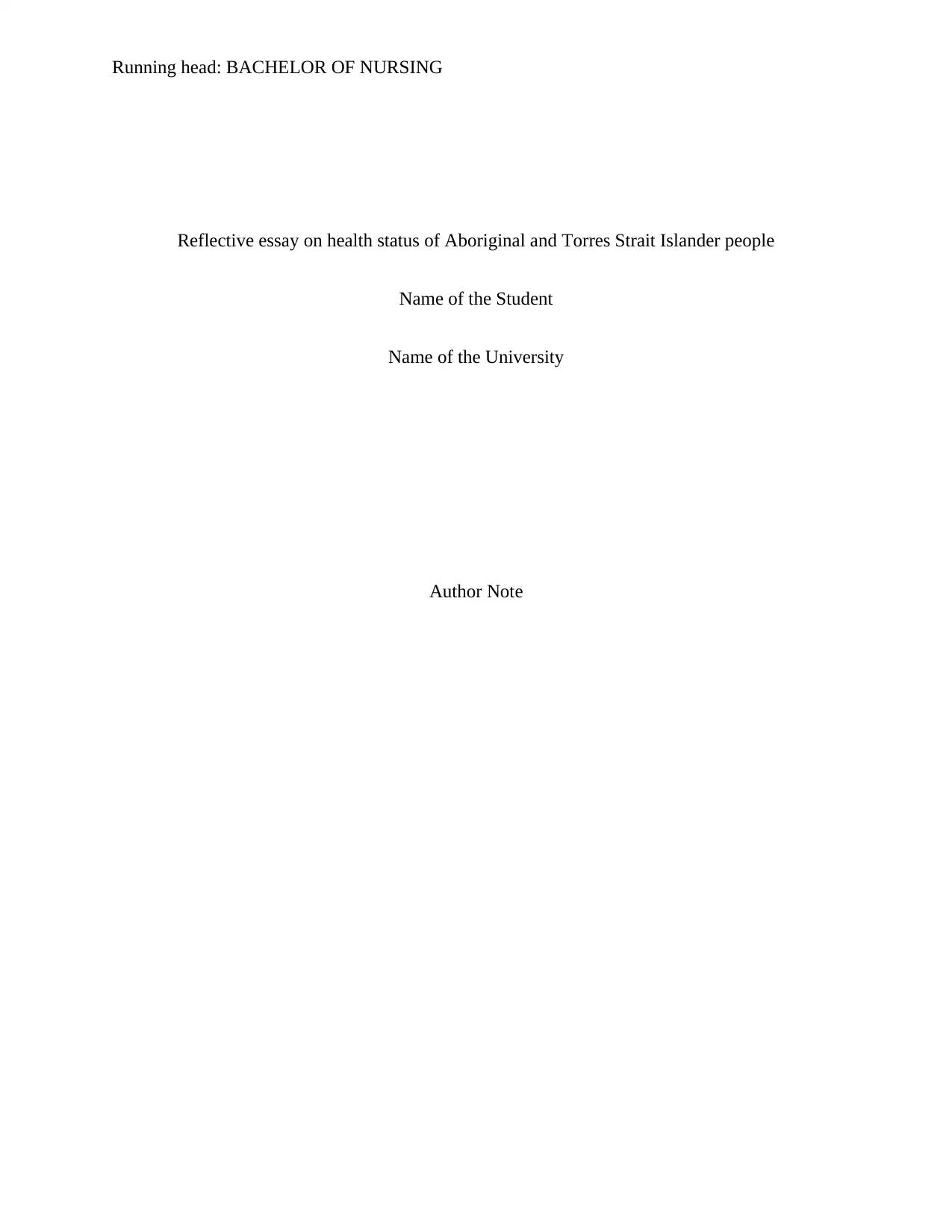
Running head: BACHELOR OF NURSING
Reflective essay on health status of Aboriginal and Torres Strait Islander people
Name of the Student
Name of the University
Author Note
Reflective essay on health status of Aboriginal and Torres Strait Islander people
Name of the Student
Name of the University
Author Note
Secure Best Marks with AI Grader
Need help grading? Try our AI Grader for instant feedback on your assignments.
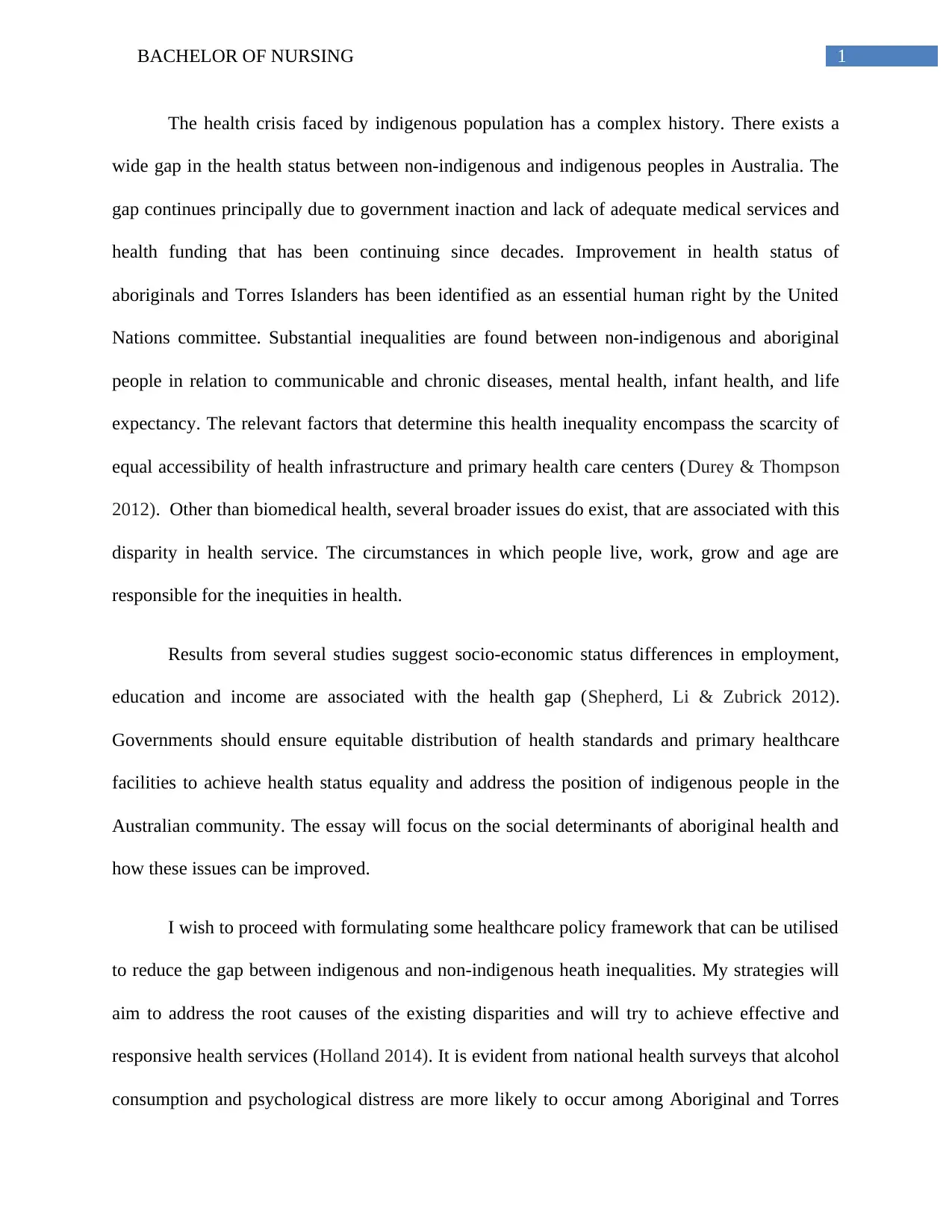
1BACHELOR OF NURSING
The health crisis faced by indigenous population has a complex history. There exists a
wide gap in the health status between non-indigenous and indigenous peoples in Australia. The
gap continues principally due to government inaction and lack of adequate medical services and
health funding that has been continuing since decades. Improvement in health status of
aboriginals and Torres Islanders has been identified as an essential human right by the United
Nations committee. Substantial inequalities are found between non-indigenous and aboriginal
people in relation to communicable and chronic diseases, mental health, infant health, and life
expectancy. The relevant factors that determine this health inequality encompass the scarcity of
equal accessibility of health infrastructure and primary health care centers (Durey & Thompson
2012). Other than biomedical health, several broader issues do exist, that are associated with this
disparity in health service. The circumstances in which people live, work, grow and age are
responsible for the inequities in health.
Results from several studies suggest socio-economic status differences in employment,
education and income are associated with the health gap (Shepherd, Li & Zubrick 2012).
Governments should ensure equitable distribution of health standards and primary healthcare
facilities to achieve health status equality and address the position of indigenous people in the
Australian community. The essay will focus on the social determinants of aboriginal health and
how these issues can be improved.
I wish to proceed with formulating some healthcare policy framework that can be utilised
to reduce the gap between indigenous and non-indigenous heath inequalities. My strategies will
aim to address the root causes of the existing disparities and will try to achieve effective and
responsive health services (Holland 2014). It is evident from national health surveys that alcohol
consumption and psychological distress are more likely to occur among Aboriginal and Torres
The health crisis faced by indigenous population has a complex history. There exists a
wide gap in the health status between non-indigenous and indigenous peoples in Australia. The
gap continues principally due to government inaction and lack of adequate medical services and
health funding that has been continuing since decades. Improvement in health status of
aboriginals and Torres Islanders has been identified as an essential human right by the United
Nations committee. Substantial inequalities are found between non-indigenous and aboriginal
people in relation to communicable and chronic diseases, mental health, infant health, and life
expectancy. The relevant factors that determine this health inequality encompass the scarcity of
equal accessibility of health infrastructure and primary health care centers (Durey & Thompson
2012). Other than biomedical health, several broader issues do exist, that are associated with this
disparity in health service. The circumstances in which people live, work, grow and age are
responsible for the inequities in health.
Results from several studies suggest socio-economic status differences in employment,
education and income are associated with the health gap (Shepherd, Li & Zubrick 2012).
Governments should ensure equitable distribution of health standards and primary healthcare
facilities to achieve health status equality and address the position of indigenous people in the
Australian community. The essay will focus on the social determinants of aboriginal health and
how these issues can be improved.
I wish to proceed with formulating some healthcare policy framework that can be utilised
to reduce the gap between indigenous and non-indigenous heath inequalities. My strategies will
aim to address the root causes of the existing disparities and will try to achieve effective and
responsive health services (Holland 2014). It is evident from national health surveys that alcohol
consumption and psychological distress are more likely to occur among Aboriginal and Torres
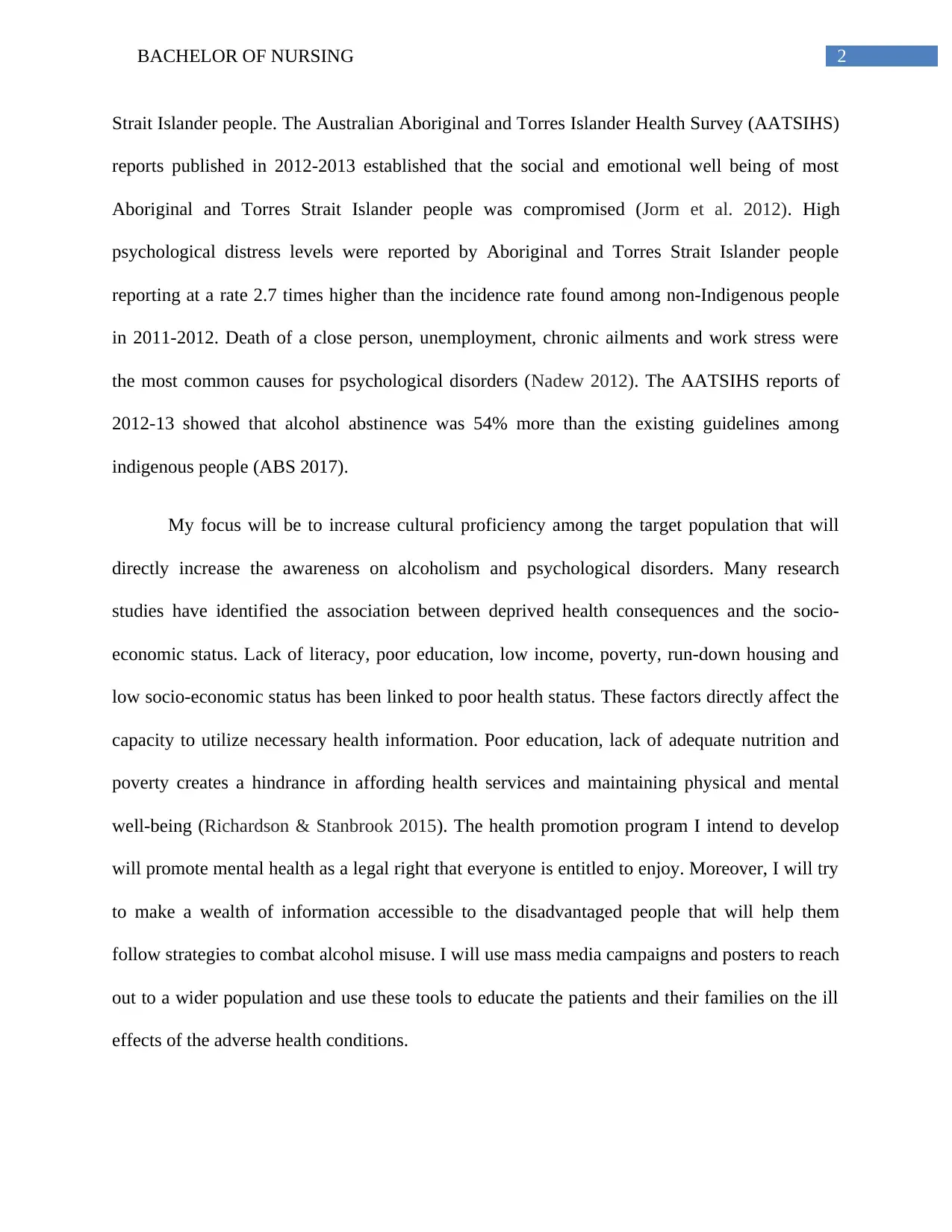
2BACHELOR OF NURSING
Strait Islander people. The Australian Aboriginal and Torres Islander Health Survey (AATSIHS)
reports published in 2012-2013 established that the social and emotional well being of most
Aboriginal and Torres Strait Islander people was compromised (Jorm et al. 2012). High
psychological distress levels were reported by Aboriginal and Torres Strait Islander people
reporting at a rate 2.7 times higher than the incidence rate found among non-Indigenous people
in 2011-2012. Death of a close person, unemployment, chronic ailments and work stress were
the most common causes for psychological disorders (Nadew 2012). The AATSIHS reports of
2012-13 showed that alcohol abstinence was 54% more than the existing guidelines among
indigenous people (ABS 2017).
My focus will be to increase cultural proficiency among the target population that will
directly increase the awareness on alcoholism and psychological disorders. Many research
studies have identified the association between deprived health consequences and the socio-
economic status. Lack of literacy, poor education, low income, poverty, run-down housing and
low socio-economic status has been linked to poor health status. These factors directly affect the
capacity to utilize necessary health information. Poor education, lack of adequate nutrition and
poverty creates a hindrance in affording health services and maintaining physical and mental
well-being (Richardson & Stanbrook 2015). The health promotion program I intend to develop
will promote mental health as a legal right that everyone is entitled to enjoy. Moreover, I will try
to make a wealth of information accessible to the disadvantaged people that will help them
follow strategies to combat alcohol misuse. I will use mass media campaigns and posters to reach
out to a wider population and use these tools to educate the patients and their families on the ill
effects of the adverse health conditions.
Strait Islander people. The Australian Aboriginal and Torres Islander Health Survey (AATSIHS)
reports published in 2012-2013 established that the social and emotional well being of most
Aboriginal and Torres Strait Islander people was compromised (Jorm et al. 2012). High
psychological distress levels were reported by Aboriginal and Torres Strait Islander people
reporting at a rate 2.7 times higher than the incidence rate found among non-Indigenous people
in 2011-2012. Death of a close person, unemployment, chronic ailments and work stress were
the most common causes for psychological disorders (Nadew 2012). The AATSIHS reports of
2012-13 showed that alcohol abstinence was 54% more than the existing guidelines among
indigenous people (ABS 2017).
My focus will be to increase cultural proficiency among the target population that will
directly increase the awareness on alcoholism and psychological disorders. Many research
studies have identified the association between deprived health consequences and the socio-
economic status. Lack of literacy, poor education, low income, poverty, run-down housing and
low socio-economic status has been linked to poor health status. These factors directly affect the
capacity to utilize necessary health information. Poor education, lack of adequate nutrition and
poverty creates a hindrance in affording health services and maintaining physical and mental
well-being (Richardson & Stanbrook 2015). The health promotion program I intend to develop
will promote mental health as a legal right that everyone is entitled to enjoy. Moreover, I will try
to make a wealth of information accessible to the disadvantaged people that will help them
follow strategies to combat alcohol misuse. I will use mass media campaigns and posters to reach
out to a wider population and use these tools to educate the patients and their families on the ill
effects of the adverse health conditions.
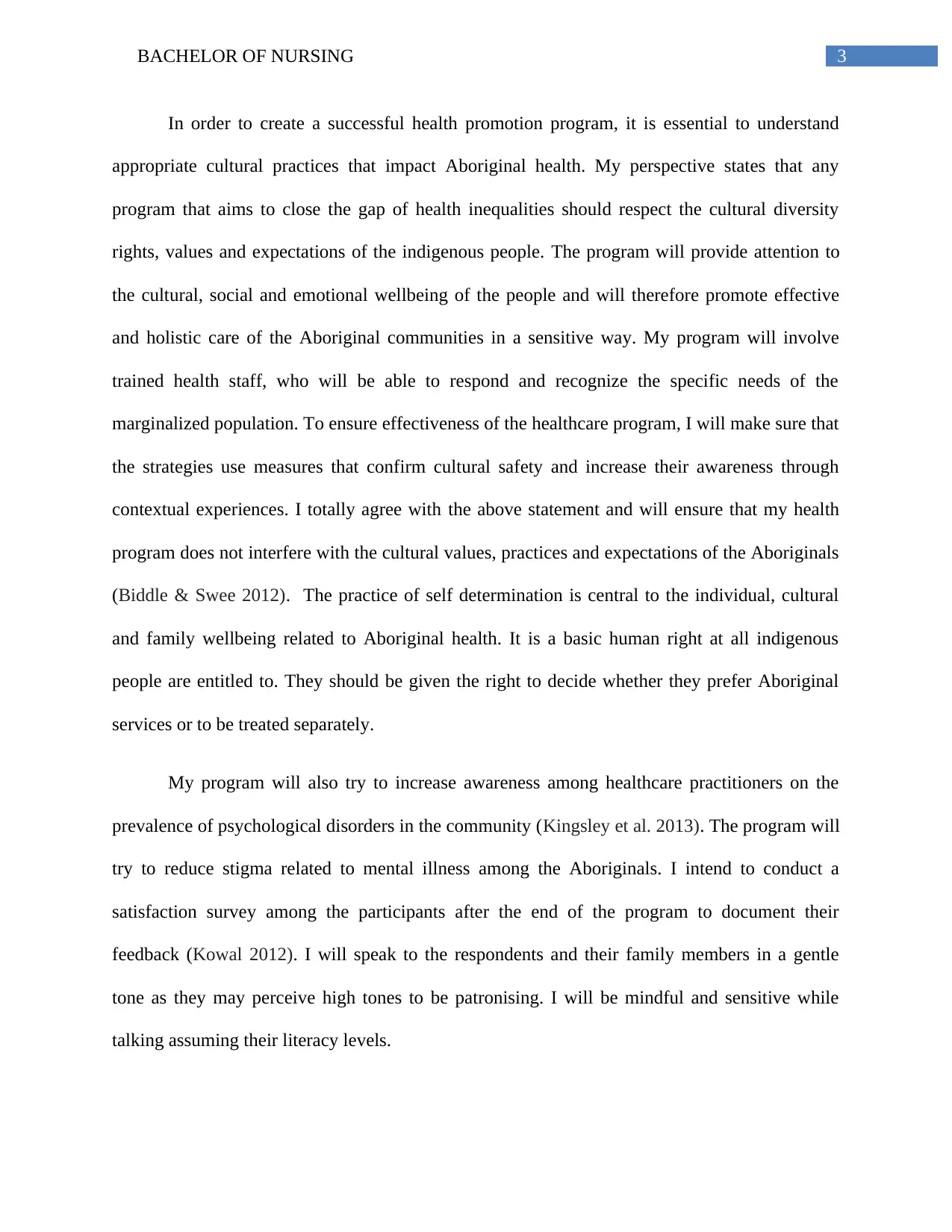
3BACHELOR OF NURSING
In order to create a successful health promotion program, it is essential to understand
appropriate cultural practices that impact Aboriginal health. My perspective states that any
program that aims to close the gap of health inequalities should respect the cultural diversity
rights, values and expectations of the indigenous people. The program will provide attention to
the cultural, social and emotional wellbeing of the people and will therefore promote effective
and holistic care of the Aboriginal communities in a sensitive way. My program will involve
trained health staff, who will be able to respond and recognize the specific needs of the
marginalized population. To ensure effectiveness of the healthcare program, I will make sure that
the strategies use measures that confirm cultural safety and increase their awareness through
contextual experiences. I totally agree with the above statement and will ensure that my health
program does not interfere with the cultural values, practices and expectations of the Aboriginals
(Biddle & Swee 2012). The practice of self determination is central to the individual, cultural
and family wellbeing related to Aboriginal health. It is a basic human right at all indigenous
people are entitled to. They should be given the right to decide whether they prefer Aboriginal
services or to be treated separately.
My program will also try to increase awareness among healthcare practitioners on the
prevalence of psychological disorders in the community (Kingsley et al. 2013). The program will
try to reduce stigma related to mental illness among the Aboriginals. I intend to conduct a
satisfaction survey among the participants after the end of the program to document their
feedback (Kowal 2012). I will speak to the respondents and their family members in a gentle
tone as they may perceive high tones to be patronising. I will be mindful and sensitive while
talking assuming their literacy levels.
In order to create a successful health promotion program, it is essential to understand
appropriate cultural practices that impact Aboriginal health. My perspective states that any
program that aims to close the gap of health inequalities should respect the cultural diversity
rights, values and expectations of the indigenous people. The program will provide attention to
the cultural, social and emotional wellbeing of the people and will therefore promote effective
and holistic care of the Aboriginal communities in a sensitive way. My program will involve
trained health staff, who will be able to respond and recognize the specific needs of the
marginalized population. To ensure effectiveness of the healthcare program, I will make sure that
the strategies use measures that confirm cultural safety and increase their awareness through
contextual experiences. I totally agree with the above statement and will ensure that my health
program does not interfere with the cultural values, practices and expectations of the Aboriginals
(Biddle & Swee 2012). The practice of self determination is central to the individual, cultural
and family wellbeing related to Aboriginal health. It is a basic human right at all indigenous
people are entitled to. They should be given the right to decide whether they prefer Aboriginal
services or to be treated separately.
My program will also try to increase awareness among healthcare practitioners on the
prevalence of psychological disorders in the community (Kingsley et al. 2013). The program will
try to reduce stigma related to mental illness among the Aboriginals. I intend to conduct a
satisfaction survey among the participants after the end of the program to document their
feedback (Kowal 2012). I will speak to the respondents and their family members in a gentle
tone as they may perceive high tones to be patronising. I will be mindful and sensitive while
talking assuming their literacy levels.
Secure Best Marks with AI Grader
Need help grading? Try our AI Grader for instant feedback on your assignments.
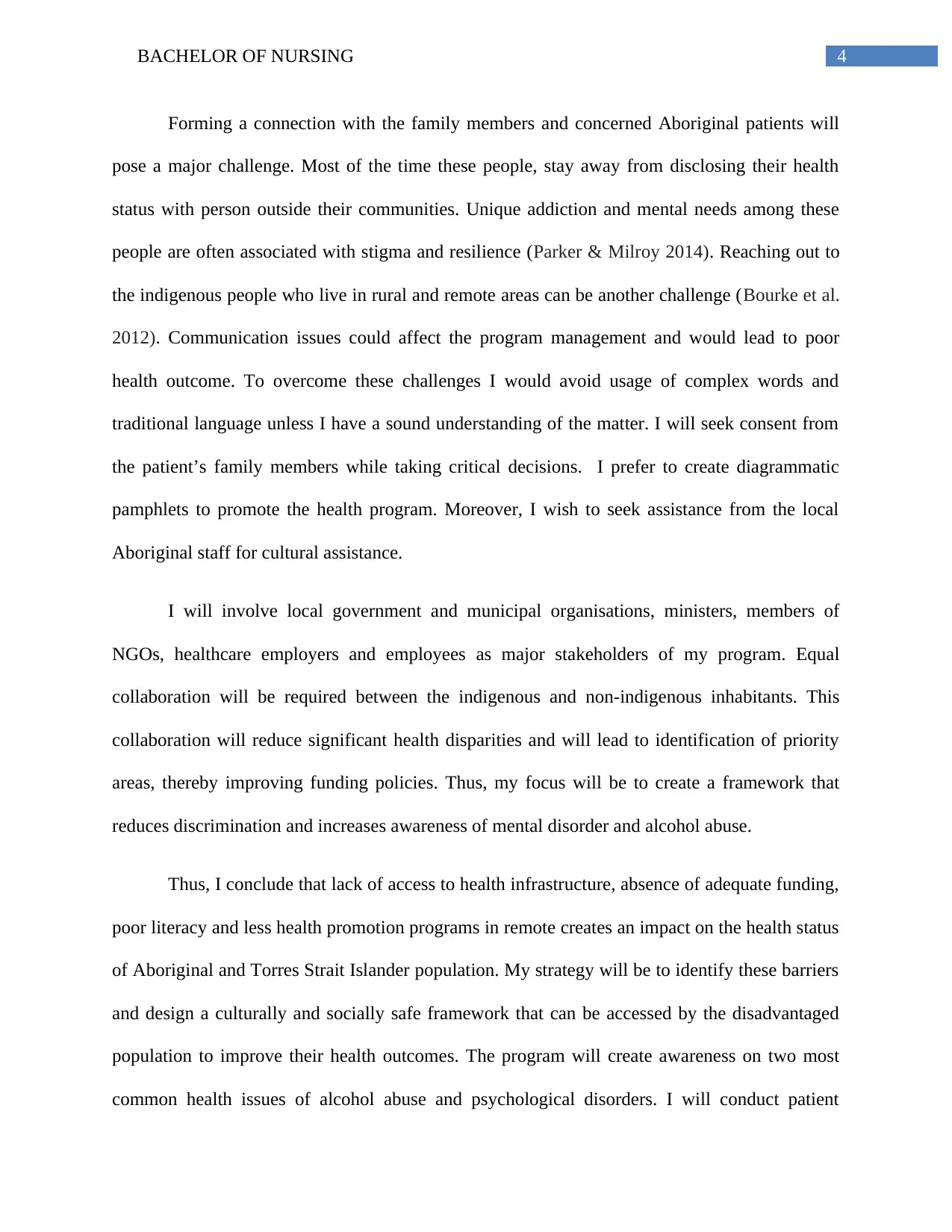
4BACHELOR OF NURSING
Forming a connection with the family members and concerned Aboriginal patients will
pose a major challenge. Most of the time these people, stay away from disclosing their health
status with person outside their communities. Unique addiction and mental needs among these
people are often associated with stigma and resilience (Parker & Milroy 2014). Reaching out to
the indigenous people who live in rural and remote areas can be another challenge (Bourke et al.
2012). Communication issues could affect the program management and would lead to poor
health outcome. To overcome these challenges I would avoid usage of complex words and
traditional language unless I have a sound understanding of the matter. I will seek consent from
the patient’s family members while taking critical decisions. I prefer to create diagrammatic
pamphlets to promote the health program. Moreover, I wish to seek assistance from the local
Aboriginal staff for cultural assistance.
I will involve local government and municipal organisations, ministers, members of
NGOs, healthcare employers and employees as major stakeholders of my program. Equal
collaboration will be required between the indigenous and non-indigenous inhabitants. This
collaboration will reduce significant health disparities and will lead to identification of priority
areas, thereby improving funding policies. Thus, my focus will be to create a framework that
reduces discrimination and increases awareness of mental disorder and alcohol abuse.
Thus, I conclude that lack of access to health infrastructure, absence of adequate funding,
poor literacy and less health promotion programs in remote creates an impact on the health status
of Aboriginal and Torres Strait Islander population. My strategy will be to identify these barriers
and design a culturally and socially safe framework that can be accessed by the disadvantaged
population to improve their health outcomes. The program will create awareness on two most
common health issues of alcohol abuse and psychological disorders. I will conduct patient
Forming a connection with the family members and concerned Aboriginal patients will
pose a major challenge. Most of the time these people, stay away from disclosing their health
status with person outside their communities. Unique addiction and mental needs among these
people are often associated with stigma and resilience (Parker & Milroy 2014). Reaching out to
the indigenous people who live in rural and remote areas can be another challenge (Bourke et al.
2012). Communication issues could affect the program management and would lead to poor
health outcome. To overcome these challenges I would avoid usage of complex words and
traditional language unless I have a sound understanding of the matter. I will seek consent from
the patient’s family members while taking critical decisions. I prefer to create diagrammatic
pamphlets to promote the health program. Moreover, I wish to seek assistance from the local
Aboriginal staff for cultural assistance.
I will involve local government and municipal organisations, ministers, members of
NGOs, healthcare employers and employees as major stakeholders of my program. Equal
collaboration will be required between the indigenous and non-indigenous inhabitants. This
collaboration will reduce significant health disparities and will lead to identification of priority
areas, thereby improving funding policies. Thus, my focus will be to create a framework that
reduces discrimination and increases awareness of mental disorder and alcohol abuse.
Thus, I conclude that lack of access to health infrastructure, absence of adequate funding,
poor literacy and less health promotion programs in remote creates an impact on the health status
of Aboriginal and Torres Strait Islander population. My strategy will be to identify these barriers
and design a culturally and socially safe framework that can be accessed by the disadvantaged
population to improve their health outcomes. The program will create awareness on two most
common health issues of alcohol abuse and psychological disorders. I will conduct patient
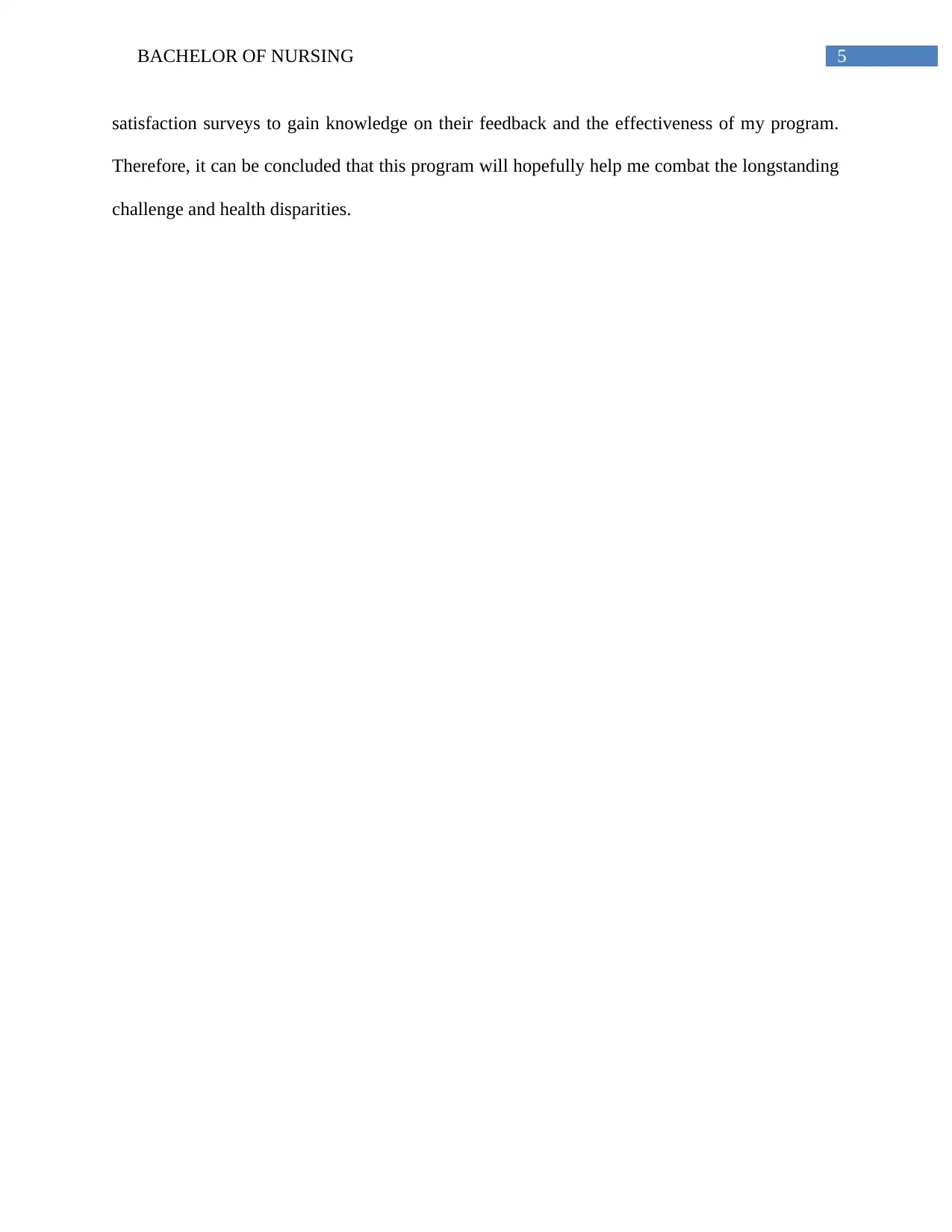
5BACHELOR OF NURSING
satisfaction surveys to gain knowledge on their feedback and the effectiveness of my program.
Therefore, it can be concluded that this program will hopefully help me combat the longstanding
challenge and health disparities.
satisfaction surveys to gain knowledge on their feedback and the effectiveness of my program.
Therefore, it can be concluded that this program will hopefully help me combat the longstanding
challenge and health disparities.
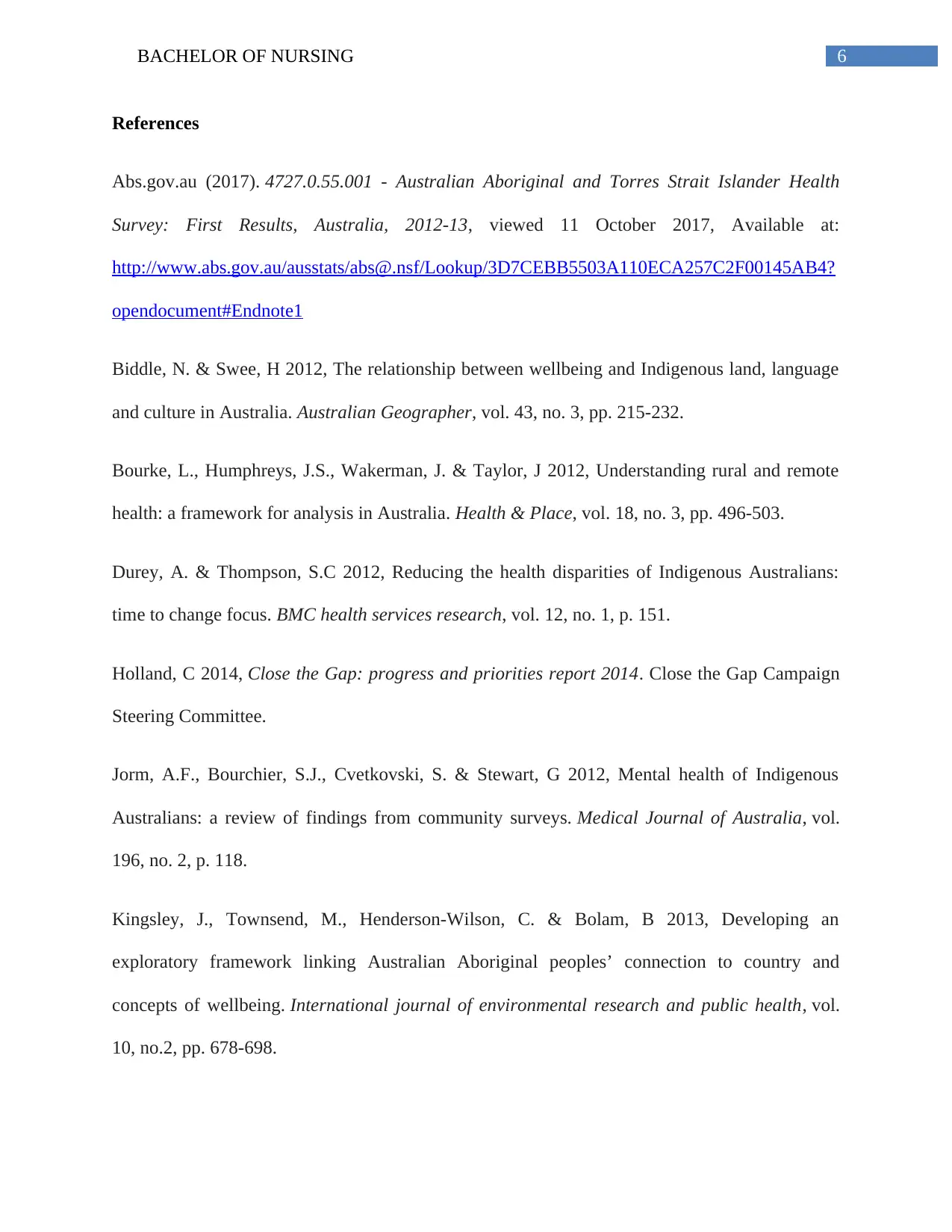
6BACHELOR OF NURSING
References
Abs.gov.au (2017). 4727.0.55.001 - Australian Aboriginal and Torres Strait Islander Health
Survey: First Results, Australia, 2012-13, viewed 11 October 2017, Available at:
http://www.abs.gov.au/ausstats/abs@.nsf/Lookup/3D7CEBB5503A110ECA257C2F00145AB4?
opendocument#Endnote1
Biddle, N. & Swee, H 2012, The relationship between wellbeing and Indigenous land, language
and culture in Australia. Australian Geographer, vol. 43, no. 3, pp. 215-232.
Bourke, L., Humphreys, J.S., Wakerman, J. & Taylor, J 2012, Understanding rural and remote
health: a framework for analysis in Australia. Health & Place, vol. 18, no. 3, pp. 496-503.
Durey, A. & Thompson, S.C 2012, Reducing the health disparities of Indigenous Australians:
time to change focus. BMC health services research, vol. 12, no. 1, p. 151.
Holland, C 2014, Close the Gap: progress and priorities report 2014. Close the Gap Campaign
Steering Committee.
Jorm, A.F., Bourchier, S.J., Cvetkovski, S. & Stewart, G 2012, Mental health of Indigenous
Australians: a review of findings from community surveys. Medical Journal of Australia, vol.
196, no. 2, p. 118.
Kingsley, J., Townsend, M., Henderson-Wilson, C. & Bolam, B 2013, Developing an
exploratory framework linking Australian Aboriginal peoples’ connection to country and
concepts of wellbeing. International journal of environmental research and public health, vol.
10, no.2, pp. 678-698.
References
Abs.gov.au (2017). 4727.0.55.001 - Australian Aboriginal and Torres Strait Islander Health
Survey: First Results, Australia, 2012-13, viewed 11 October 2017, Available at:
http://www.abs.gov.au/ausstats/abs@.nsf/Lookup/3D7CEBB5503A110ECA257C2F00145AB4?
opendocument#Endnote1
Biddle, N. & Swee, H 2012, The relationship between wellbeing and Indigenous land, language
and culture in Australia. Australian Geographer, vol. 43, no. 3, pp. 215-232.
Bourke, L., Humphreys, J.S., Wakerman, J. & Taylor, J 2012, Understanding rural and remote
health: a framework for analysis in Australia. Health & Place, vol. 18, no. 3, pp. 496-503.
Durey, A. & Thompson, S.C 2012, Reducing the health disparities of Indigenous Australians:
time to change focus. BMC health services research, vol. 12, no. 1, p. 151.
Holland, C 2014, Close the Gap: progress and priorities report 2014. Close the Gap Campaign
Steering Committee.
Jorm, A.F., Bourchier, S.J., Cvetkovski, S. & Stewart, G 2012, Mental health of Indigenous
Australians: a review of findings from community surveys. Medical Journal of Australia, vol.
196, no. 2, p. 118.
Kingsley, J., Townsend, M., Henderson-Wilson, C. & Bolam, B 2013, Developing an
exploratory framework linking Australian Aboriginal peoples’ connection to country and
concepts of wellbeing. International journal of environmental research and public health, vol.
10, no.2, pp. 678-698.
Paraphrase This Document
Need a fresh take? Get an instant paraphrase of this document with our AI Paraphraser
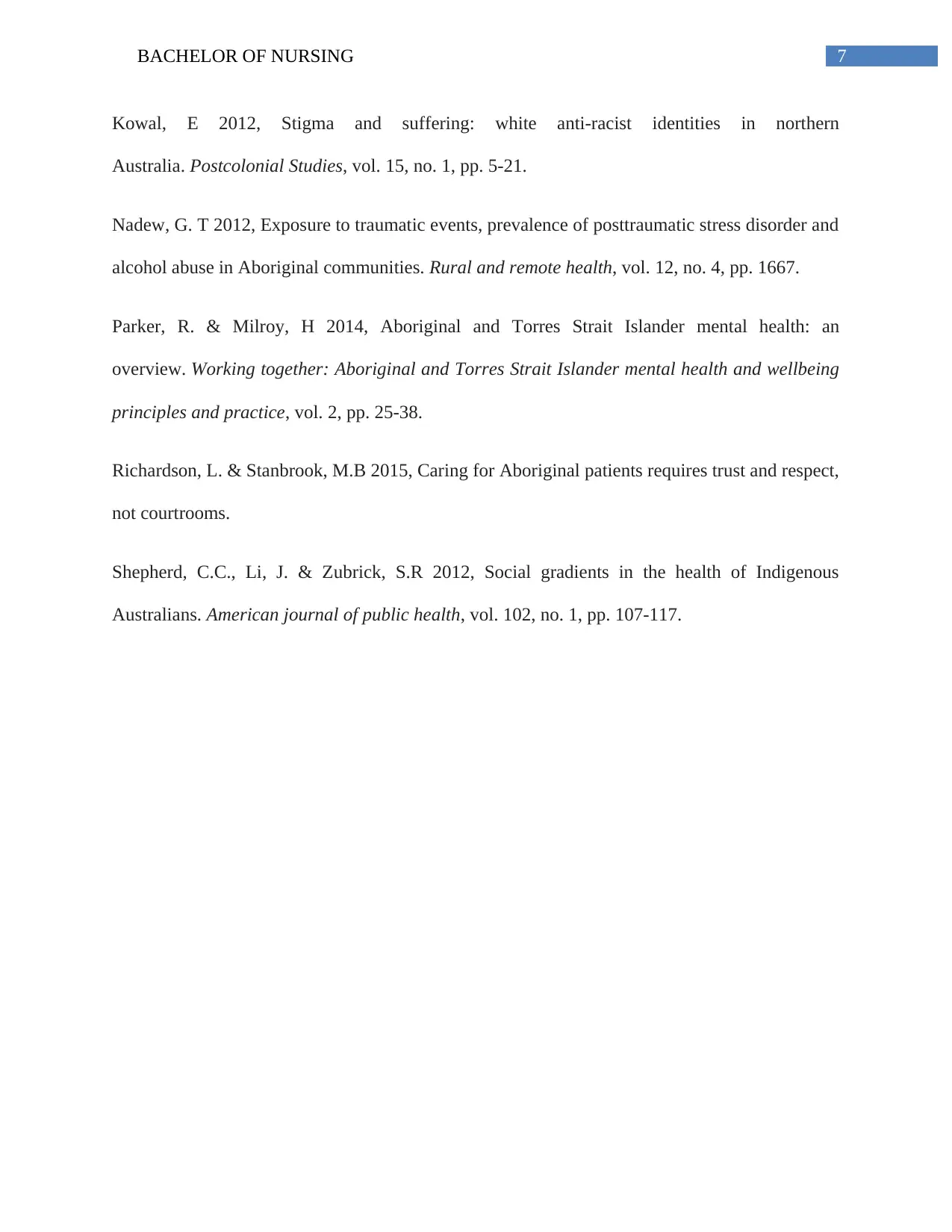
7BACHELOR OF NURSING
Kowal, E 2012, Stigma and suffering: white anti-racist identities in northern
Australia. Postcolonial Studies, vol. 15, no. 1, pp. 5-21.
Nadew, G. T 2012, Exposure to traumatic events, prevalence of posttraumatic stress disorder and
alcohol abuse in Aboriginal communities. Rural and remote health, vol. 12, no. 4, pp. 1667.
Parker, R. & Milroy, H 2014, Aboriginal and Torres Strait Islander mental health: an
overview. Working together: Aboriginal and Torres Strait Islander mental health and wellbeing
principles and practice, vol. 2, pp. 25-38.
Richardson, L. & Stanbrook, M.B 2015, Caring for Aboriginal patients requires trust and respect,
not courtrooms.
Shepherd, C.C., Li, J. & Zubrick, S.R 2012, Social gradients in the health of Indigenous
Australians. American journal of public health, vol. 102, no. 1, pp. 107-117.
Kowal, E 2012, Stigma and suffering: white anti-racist identities in northern
Australia. Postcolonial Studies, vol. 15, no. 1, pp. 5-21.
Nadew, G. T 2012, Exposure to traumatic events, prevalence of posttraumatic stress disorder and
alcohol abuse in Aboriginal communities. Rural and remote health, vol. 12, no. 4, pp. 1667.
Parker, R. & Milroy, H 2014, Aboriginal and Torres Strait Islander mental health: an
overview. Working together: Aboriginal and Torres Strait Islander mental health and wellbeing
principles and practice, vol. 2, pp. 25-38.
Richardson, L. & Stanbrook, M.B 2015, Caring for Aboriginal patients requires trust and respect,
not courtrooms.
Shepherd, C.C., Li, J. & Zubrick, S.R 2012, Social gradients in the health of Indigenous
Australians. American journal of public health, vol. 102, no. 1, pp. 107-117.
1 out of 8
Related Documents
Your All-in-One AI-Powered Toolkit for Academic Success.
+13062052269
info@desklib.com
Available 24*7 on WhatsApp / Email
![[object Object]](/_next/static/media/star-bottom.7253800d.svg)
Unlock your academic potential
© 2024 | Zucol Services PVT LTD | All rights reserved.





